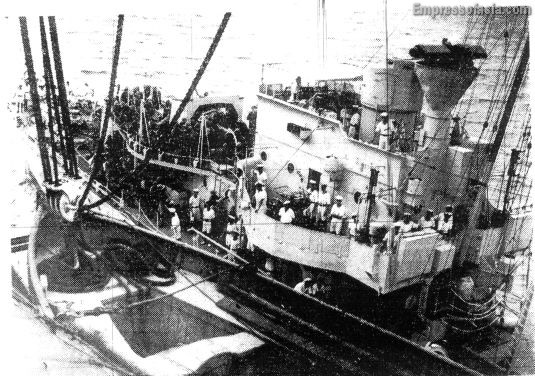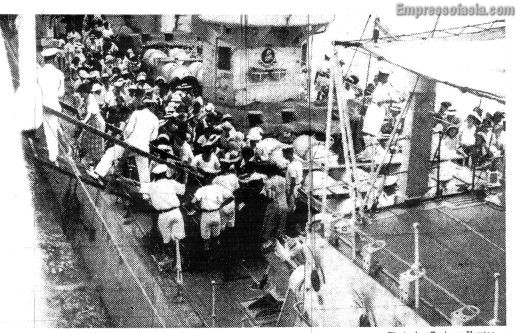The August 1937 Reinforcement and Evacuation

On July 7, 1937 an incident at the Lugou Bridge near Beijing, led to open hostility between Japan and China in a quickly escalating conflict that soon swept across northern China. On August 13th the conflict reached Shanghai and British authorities became anxious to take steps to protect British interests and British nationals from the encroaching conflict. In anticipation of this danger the Royal Navy requisitioned the EMPRESS OF ASIA, in Hong Kong after arriving from a regular scheduled visit to Manila, on August 15th, 1937. The Union Jack was painted on the deck and hull to identify the ship as a non-combatant.
On August 16th the ship sailed for Shanghai with over 700 troops, members of the Royal Ulster Rifles who were assigned to complement the British garrison at Shanghai. On August 18th, 1937, the ship reached and anchored at Blockhead Buoy, 20 miles from Shanghai and six miles from Woosung, this anchorage was maintained avoiding the more dangerous waters at Shanghai. British destroyers met the EMPRESS OF ASIA at this position and transported the Royal Ulster Rifles up-river to Shanghai.
Three British destroyers, HMS DUNCAN, HMS DUCHESS, and HMS DELIGHT brought some 1300 evacuees, mostly women and children who were British nationals, including 15 Canadians, from Shanghai to the ship, which sailed for Hong Kong on August 18th, 1937. Hong Kong was reached on August 21st, 1937 and the refugees were disembarked and the EMPRESS OF ASIA resumed the regular Pacific schedule. On Sept 11th, 1937 the voyage was concluded with the EMPRESS OF ASIA reaching Victoria and Vancouver by way of Hawaii.

One of the individuals evacuated from Shanghai was Margart H. Brown, a Canadian missionary who wrote a letter to the Vancouver newspaper, The Daily Province from the EMPRESS OF ASIA describing her situation. The letter was printed on pages 1-2 of the September 8th 1937 edition of The Daily Province.
Excerpts from this newspaper article are quoted here:
Miss Margart H. Brown is a Canadian missionary well known to many people in Vancouver. She has spent many years in China and has for the past several years been a member of the staff of the Christian Literature Society at Shanghai. This letter was written from the Empress of Asia, approaching Hong Kong, to a member of the staff of the Daily Province.
There are about a half dozen Canadians among the 1500 women and children being evacuated from Shanghai by this ship. We would like to tell Canadians everywhere how grateful we are to the British authorities, the British navy and the Canadian Pacific officers and crew of this ship, for all they have done for us.
All have been magnificent and we would like our fellow countrymen to know as so far as we are aware our own Canadian Government have shown no concern about our fate. No doubt they were fully conscious that the British authorities would-as always-do everything possible for us.
Events developed so rapidly in the end that even those who, like myself had been through the last 1932 war could hardly believe such a catastrophe could happen.
On Wednesday, August 11th, I received a cable from Toronto enquiring if travel to Szechuen Province was safe. I visited the British consul and afterwards at noon cabled ‘Szechuen travel safe’ though all must go through Shanghai. Next night the defense force was mobilized and the following day (Friday the 13th) I saw the first shell fired.
Saturday will live forever in the minds of all who were in Shanghai that day. I was at the office when the first big Chinese air raid took place and saw the second bomb fall, just missing the Idzumo by fifty feet.
Our building is only a short distance away and it was like the crack of doom. That afternoon (Saturday) the Cathay Hotel and the Palace were bombed and then the terrible bomb at the New World, not far from our boarding house. We saw the bursts of shrapnel very close There were 1400 casualties from that one bomb and several were personally known to me. We felt as if our whole world was being shattered.
Next day was even more nerve-wracking as shrapnel hit our house and the radio continued to inform us that Mayor Yui said the Chinese had knowledge that the Japanese had anti-aircraft guns on the top of their two banks on the Bund and that unless they were removed he would not be responsible for what would happen.
Though the Japanese came out with a sharp denial, as did foreign observers, Mayor Yui reiterated his threat...
That night the order came for the evacuating of British women and children. We were stunned as we thought our sheer numbers made it impossible. I did not plan to leave at first, but Monday morning at 10 o’clock our general secretary phoned that it was necessary to close the office as we were so near the Japanese consulate, and the British consulate, just beside us had already moved.
About 2 p.m. on Monday I went to the Shanghai Club to make plans and register for evacuation. It was a nervy affair, but had to be done. The greatest fear was of food shortages and food riots with these tens of thousands of Chinese refugees milling around the streets.
I live in a boarding house, and we took in some foreigners evacuated from the Yangtsepoo district. They had a terrible experience and two of them were in the third car behind, and the last one was blown up outside the Great World amusement place. I had other friends in the Cathay and Palace at the time.
We have about 400 more than a full passenger list, so their problems are terrific. They were commandeered in Hong Kong and brought the Fusiliers up and have had to turn around and take us back. They have given us the run of the ship and put all their resources at our disposal. Most of us are living and sleeping on deck, and it has been perfect until a few hours ago when it began to rain. But we are almost in Hong Kong and it matters very little. How I wish we were pulling into Vancouver.
This is my third evacuation-surely it ought to be the last. I think I’ve had more than my share. However the ride down the river in the destroyer was a thrill, though the bombardment made it a little too much so.
But the British navy gives you a sense of security and the men treated us like queens, and words can not tell how good they were to the children and babies. Tell Canada how proud we are to be “British”.
